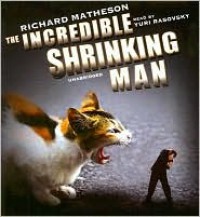 It's kind of nice when the title of a book is also a perfect, if brief, description of the plot. The shrinking man of the title is Scott, who is shrinking exactly 1/7 of an inch every day. We're watching him during his last week before vanishing entirely, trapped in a basement with little food or water and stalked by an enormous (to him) black widow. Exactly how he got to be this size is shown through a series of flashbacks.
It's kind of nice when the title of a book is also a perfect, if brief, description of the plot. The shrinking man of the title is Scott, who is shrinking exactly 1/7 of an inch every day. We're watching him during his last week before vanishing entirely, trapped in a basement with little food or water and stalked by an enormous (to him) black widow. Exactly how he got to be this size is shown through a series of flashbacks.In a way, it's almost like two books. One is a tediously, almost painfully detailed survival novel. If the book were entirely like the "present day" sections, I wouldn't have liked it all that much. But the flashbacks are far better, and give a much more detailed idea of what the shrinking process must have been like for him. These are the best written parts of the book, and I found myself tuning out during the present day sections. I think Matheson put a good deal of thought into exactly how shrinking like this would affect a person, and others' perspective of them.
But it really would have been helpful if Scott were sympathetic. I get that he's under a lot of stress and has some traumatizing experiences while shrinking, but he brings most of that on himself. This is where "product of its time" comes into play. The book was first published in 1956, and it frames a crisis of masculinity in a very 50s, white, suburban, middle class sort of way. A modern man, by way of contrast, wouldn't wait until the family was in dire financial straits before "allowing" his wife to work at all. He might also be able to see his wife in terms broader than merely her sexual availability to him, and have more than a passing interest in his own daughter. It is, admittedly, the sort of attitude that I'm not surprised to see in a character written in the 50s, but it was this, as well as his thoughtless, needless risk taking, that made him almost entirely unsympathetic to me. Perfect example, from the end of the book. Scott is now small enough that he lives inside a dollhouse. He's alone in the room and notices that the outside door is ajar. So he decides to shut it on his own. Disaster ensues, naturally, but I was astonished at his complete inability to even guess that it might be a bad idea.




